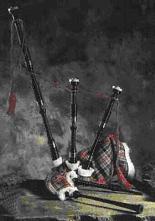
Bagpipes have been played through thousands of years of history.
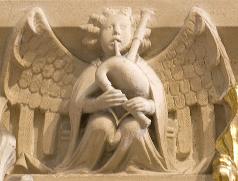
The instrument occasionally shows up in Medieval art, such as this carving of an angel.
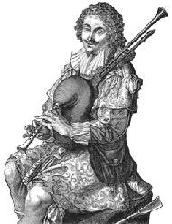
Early models only had one or two drones over the shoulder.
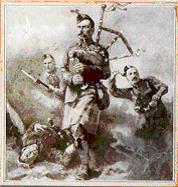
Brave pipers were the first to storm the battlefields.
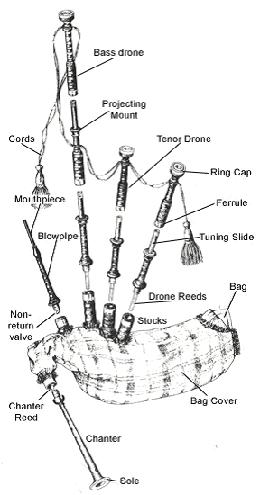
|
|
 |
Bagpipes ~
A Brief History
The pipes have captured audiences the world over since ancient times
They are among the oldest musical instruments, so old that their true
age and origin are debated among historians.
Contrary to popular belief, the bagpipes were not invented in Scotland or
Ireland. It is widely believed that the pipes were originally created in the
middle east, with supporting evidence in Egypt and eventually Greece and
Rome. The use of the instrument soon spread throughout Europe,
carried by the Celts and Roman invaders. It's music and unique sound
were popular among the common people and enjoyed in fairs, weddings
and open-air dances.
During the late Middle-Ages, the fate of the instrument began to show as
more and more indoor activities became popular. The loud pipes were not
invited among the more elaborate instruments of the day and soon the
popularity of the bagpipes began to wane... except in Scotland.
Its martial music appealed to the warlike spirit of the Scottish and at an early date it superseded the harp in their favor. The original form with bag, chanter, blowpipe and one drone remained unaltered till around 1500 when a second drone was added. A third – the big drone – being added about 200 years later.
Dynasties of pipers emerged, such as MacCrimmons, MacKays, MacGregors, and Cummings, who performed the duties of official piper for their clan chiefs through successive generations and who sustained and generated the music. Pipers in those times were privileged individuals, worthy of a seat at the chieftain's table. Their music inspired armies to surge forth in the heat of battle and yet soothed their mourning hearts at the burial of a fellow clansman.
Bagpipes could be heard up to 10 miles away in the Highlands and they were perfect for sending tonal messages from one end of a battlefield to the other. Because of the importance of the bagpipes to any Highland army, they were aimed upon by the British forces during the Highland uprising in the 1700s. After England defeated Scotland's Bonnie Prince Charlie in 1745, kilts and bagpipes were outlawed, the pipes being classified as "instruments of war". To play them would warrant an execution.
By the time the ban was lifted, it had done its job well. The Scots were well integrated into the British Empire.
Never has an instrument been so loved by a people and yet so feared by their enemies as the Highland bagpipes. The pipes are a symbol of strength, the salve of the soul, and the prize of Clans.
The Scottish regiments earned strong reputations as some of the bravest and fiercest in battles from Waterloo where Napoleon was defeated to the Boer Wars in South Africa to the defeats of the independent rajahs of India. But where ever they went, the Scottish regiments brought bagpipes with them. By then using modern weapons of the British army, the soldiers continued to be inspired by their highland bagpipe on the battlefield. And the pipers continued to lead. In the early days of World War I they leaped from the trenches in charges against the German machine guns, leading the troops through the hail of bullets. After some time an order was issued - pipers were to remain behind the trenches and not lead - because they became targets, and were killed faster than new ones could be taught. Yet their courage remained unabated. The Scottish regiments still maintain their pipe bands with pride today.
The Great Highland Bagpipe has spread throughout the world, wherever the Scottish people have gone. New Zealand, Australia, and Canada all have strong piping traditions, and it is growing at a steady pace in the United States as well. Here in Ohio, you can enjoy the pipe band and solo competitions at the annual Ohio Scottish Games in the town of Wellington. Competitions are taken seriously and performers rehearse endlessly in preparation to prove their skills.
If you are interested in having the pipes played at your next event, or would like to learn to play for yourself, feel free to contact me at (330)958-8049 or send to brian@akronpiper.com I serve the Northeast Ohio community and would be glad to hear from you.
|
|

